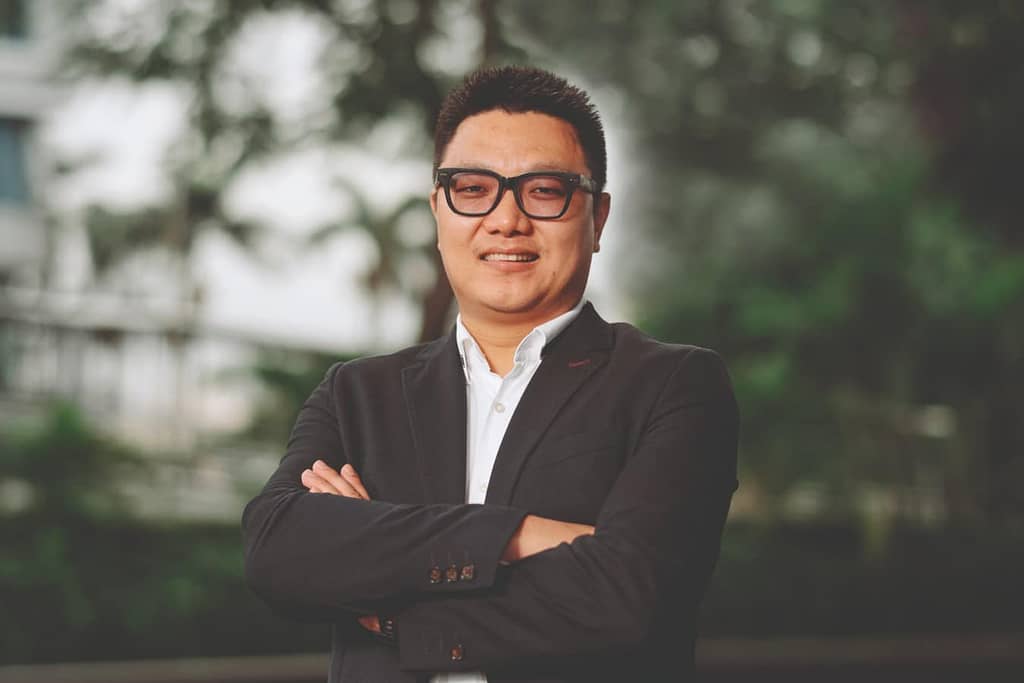From start-up to store domination, Tomoro Coffee CEO Xing Wei Yuan explains how the tech-enabled coffee company is making specialty coffee affordable to the masses, with ambitious plans to become Southeast Asia’s largest coffee chain.
When Tomoro Coffee CEO Xing Wei Yuan (known as Star in English) first considered what his fourth start-up business should be, he wasn’t convinced a coffee chain business was the answer.
His previous other start-ups had varying degrees of success, but none of them were in the food and beverage sector.
In 2016, Star was the Director of Product Management for Oppo smartphones in the overseas market before coming to Indonesia to jump-start its entry in the local market. With Star’s input, Oppo’s market share increased from 12 to 46 per cent in the Kalimantan Barat province in less than six months. He later co-founded J&T Express, an international delivery company; and from 2018 to 2021 founded the Imoo electronic appliance and Imoo Watch Phone, a smart watch for kids. Star says although Imoo became “very famous” with strong uptake in Indonesia, the product experienced a drop in sales after the global pandemic.
As such, Star returned to university in 2021 and completed an Executive Master of Business Administration at the National University of Singapore. It was during this time that he started talking with investors and asked: “What’s the best type of business in the world? What’s the one product that can have longevity and make people happy?”
“A few people told me to consider soft drinks and milktea-based businesses because they had an easier point of entry, but when I met Fish [Sun] (Tomoro Coffee Vice President, Products and Supply Chain), he convinced me that coffee was a product with a lot more brand loyalty and lifetime value to the customer. I changed my mind,” Star says.
The pair met in January 2022, three days before Chinese New Year. Star explained that the venture capital firms he had previously worked with – supporting more than 300,000 staff across 10 different business units including a cosmetic brand, record label and construction materials –was considering a coffee chain in Southeast Asia.
Five days later, the partnership was confirmed, and Fish followed Star to Jakarta on 11 April 2022. Together, they opened what would become the first in a line-up of Tomoro coffee shops from 9 August 2022.
Star says the key differential in the way he approached his fourth start-up, was asking investors to pull talent from outside the organisation.
“It was a bit of a culture shock for the Chinese-backed company. But we needed to put together a team that embraced a strong culture from the start, and we did that by gathering different talent from different backgrounds,” Star says.
That start-up team consists of Chief Financial Officer Joey Zhong, formerly of Honeywell Asia–Pacific, a company that produces plane engines in Shanghai; Sun, who Co-founded Fisheye coffee chain in 2010 after working with tech-giant Apple for 10 years; Head of Coffee Yi Quin Lei, who worked for Sony in Beijing and Sun at Fisheye; Tomoro Coffee’s Marketing Director, Nikki Chen, a former brand and marketing director for Oppo in Malaysia; and VP of Business Developments Super Wang, formerly Operations VP for Vivo phones in Indonesia.
“Our business exists due to the team behind it. It’s not about the money, the model, or even the product. Our success is determined by the group of people behind the product, sticking together,” Star says.
“As for me, my job is to make the big decisions, grow the team, and help make it a world-class, reliable coffee chain.”
At first, Star says Tomoro Coffee had a soft market entry in order to test its business model and ensure its product met locals needs. Then things started to accelerate.
At the time of print, Tomoro Coffee had 271 stores. By end of 2023 it planned to have 400 stores open, averaging two new outlets a day, with a total 1500 stores by end of 2024, and several store expansions in Singapore, the Philippines, and China.
“Currently, we are [in the] number one [position] in the Greater Jakarta area, and by 2024 end, we should be number one in Indonesia in terms of number of stores,” Star says.
“We are not running at full speed right now with our eyes blinded. We are constantly adjusting the business model, the product, the team, and processes. We’ve already paused four times to improve the data, and iron out a few obstacles, and now we have started to pick up pace again. I still don’t think we’re running as fast as we want to be, but we are running in the right direction. This is largely because we have been ‘standing on the shoulders of giants’ who already had their feet on the ground in the Indonesian landscape.”
Ready and steady
Tomoro Coffee’s approach to innovation is inspired from milk and tea businesses that celebrate frequently updated product offerings, recipes, and flavour combinations.
“The consumer is loyal to the product, not necessarily loyal to the brand,” Star says. “If you look at specialty coffee shops in particular, quite often they change the seasonality of beans, but the menu selection is very limited. There’s not as much innovation, which is in contrast to milk and tea businesses. We do things a bit differently. We offer a great classic specialty espresso menu but on top of that, we want to offer customers a broader menu of coffee beverages that we add to each month.”
The first observation Star made when Tomoro Coffee came to Indonesia, was that all the local coffee shops offered a version of Gula Aren, an iced latte with palm sugar. Tomoro Coffee created its own interpretation of the national drink using local ingredients, which at the time, became the band’s most dominant beverage sold.
“We didn’t stop there. We decided to create a whole menu dedicated to Indonesian flavours, which celebrates a specific taste profile, such as pandan coffee beverages. This was our first challenge – embracing the local market with our own interpretation of local flavours,” Star says.
“The other thing we started looking into was using local ingredients to create plant-based beverages. Most other coffee business in Indonesia only served oat milk as a substitute to regular dairy milk. We decided to treat oat milk on its own and develop an entire menu around it. That became an instant hit, especially when we paired it with palm sugar. It meant we could have a higher selling price too.”
Tomoro Coffee explored other plant-based milks in the same way, helping to create a menu of 40 Skus that is dominant on latte variations. Whichever type of dairy or dairy alternative the brand uses, Star says retaining the quality of the espresso base is critically important, and that’s where Eversys machines come in for consistency and productivity.
Tomoro Coffee shops use Eversys E’4 two-group machines, which can handle more than 1200 cups per day for high-volume stores, and Eversys Cameo single-group models, which can produce up to 400 cups per day.
“We want to make specialty coffee super affordable without cutting corners on quality, and maintaining reasonable healthy margins. The way we do that is by using automation solutions like Eversys machines, the Tomoro Coffee app, and a small flexible store format, which ensures reduced operational costs, maintains a high-quality product, and a high-margin business model. This is a real achievement for us,” says Star.
“The way Eversys approaches coffee production matches our vision. It took a while to convince [our investors] that automation is the way to go, in order to achieve specialty coffee at high quality, with high efficiency, and at a super affordable price when other players in the Indonesian market achieve hundreds of stores with a manual coffee-making approach. But the answer is as clear as day/night. Nobody asks us about our reason for using automation anymore, they know our decision is the right one.”
This decision, Star says, has allowed Tomoro Coffee to grow, and learn more about its customer’s drinking and spending habits via its dedicated mobile ordering app. In this way, the company produces targeted marketing by segmenting its audience based on age, brand experience, and beverage preference.
“Just as I discovered through working in the mobile phone industry, every generation is looking to beat the last generation [with ideas and concepts] that can improve and enhance a product and experience, and I knew we could deliver this with a new coffee business,” Star says.
“In China, many competitors only care about their business model, not about the product. But in other Southeast Asian countries, we can see that there is a strong appreciation for the relationship between farmers and consumers, and the relationship between the roaster and the consumer.”
To build on its importance, Tomoro Coffee will expand its trading relationships to work directly with coffee farming communities in Indonesia. It will also open its own dedicated roastery in Jakarta in early 2024 to assist with growing volume, which at time of print, was managing almost five tonnes per day.
“We want to be providing the freshest coffee to our consumers by having our own roastery to roast on demand. We’re not looking to cut costs. We’re looking to produce a better product with a taste profile we’re confident in for our market. We ensure that all the beans in our stores are consumed in less than 60 days after roasting,” Star says.
In five years’ time, Star hopes Tomoro Coffee will have the same success as its counterparts Oppo and J&T Express, however, the first step is tackling local growth through expansion in the Indonesian market.
“Tomoro Coffee is an international brand that started its journey in Indonesia. Step by step we’re focused on the localisation of the brand. Then we hope every corner of the world can taste Tomoro Coffee,” Star says.
“Tomoro Coffee is about the future. It’s about encouraging our consumers to embrace whatever comes next, be their best self, and embrace their dreams. Hopefully our product inspires them to do so.”
This article was first published in the January/February 2024 edition of Global Coffee Report. Read more HERE.
The post Tomoro Coffee’s Xing Wei Yuan discusses the company’s growth appeared first on Global Coffee Report.


